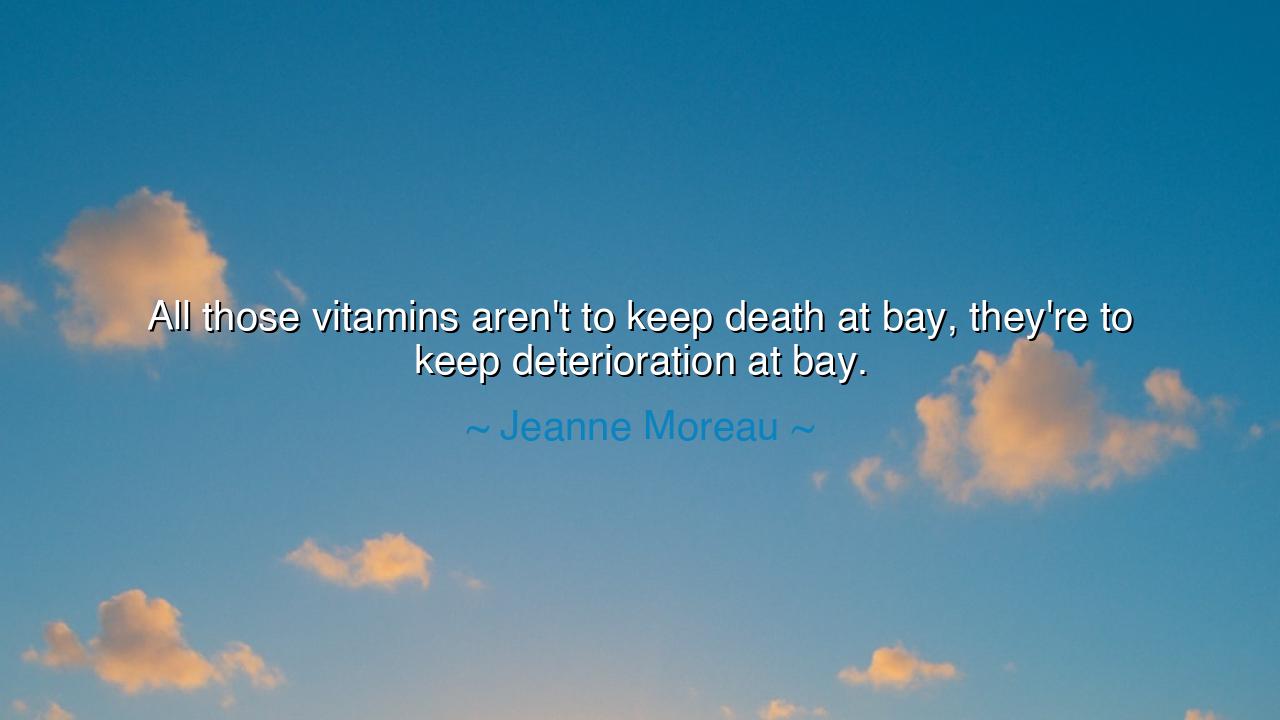
All those vitamins aren't to keep death at bay, they're to keep






In the wise and bittersweet words of Jeanne Moreau, “All those vitamins aren't to keep death at bay, they're to keep deterioration at bay,” we hear a voice both playful and profound—a voice that has looked upon life not with denial, but with understanding. Moreau, that timeless French actress whose beauty deepened rather than faded with age, reminds us of a truth most flee from: that death is inevitable, but decay is not. Her words shimmer with a quiet defiance, not against mortality itself, but against the slow surrender of vitality, of spirit, of self. She does not mock the pursuit of health; rather, she gives it its proper place—not as a battle against death, which cannot be won, but as a reverent act of preservation, a way to honor life while it still burns within us.
The meaning of her words rests upon this distinction between death and deterioration. Death is the great certainty that shadows every birth, the final silence to which all living things must one day return. It is not an enemy to be vanquished, but a boundary to be accepted. Deterioration, however—the crumbling of body and spirit before life’s natural end—is a foe that may indeed be resisted. Moreau suggests that the true purpose of nourishment, of care, of wellness, is not to delay the inevitable moment when breath ceases, but to keep the flame of being bright and whole for as long as it burns. To take vitamins, to exercise, to nourish oneself—these are not acts of denial, but of respect for life. They are gestures of gratitude to the body and soul that carry us through this mysterious journey.
There is a deeper spiritual wisdom hidden within her wit. To keep deterioration at bay is not merely to preserve the flesh, but to guard the heart and mind from decay—the cynicism, the bitterness, the apathy that so often corrode the spirit long before death arrives. In this sense, Moreau speaks not of medicine, but of mindfulness. The greatest nourishment is not only that which strengthens the body, but that which feeds the soul: art, love, laughter, curiosity, forgiveness. Those who tend only to their physical health and neglect their inner vitality are like those who polish a vessel but let its contents sour. Moreau, an artist who lived and worked with vigor into her old age, understood that to age gracefully is not to cling to youth, but to nurture the parts of oneself that do not wither—wisdom, creativity, compassion.
History offers us many who lived by this truth. Consider Michelangelo, who, well into his eighties, still sculpted with trembling hands but unbroken will. His body bent beneath the years, yet his spirit remained upright, radiant, aflame. He knew, as Moreau knew, that no potion, no elixir could fend off death—but one’s devotion to craft, to purpose, could stave off deterioration. His art, like hers, was a form of nourishment—a vitamin for the soul. Through their lives, both showed that vitality is not a matter of age, but of engagement. To live fully, one must remain awake, curious, and in love with the world, even as time quietly claims the body.
Yet there is also tenderness in Moreau’s reflection—a recognition that the desire to stay whole, to care for oneself, springs from love, not vanity. She does not mock those who seek health, for she, too, cherished the gift of living. What she reveals is the futility of trying to outrun death, a race that none can win. Instead, she invites us to run another race—the inward one, where the goal is not survival, but serenity; not everlasting youth, but enduring grace. Her words invite us to ask: are we caring for ourselves out of fear, or out of reverence? The answer to that question defines the quality, not the length, of our days.
In the rhythm of her truth lies a challenge for all who hear it: accept death, but resist decay. Let your body be nourished, but let your spirit be nourished more. Let your strength come not from denial of mortality, but from love of the life you have. Eat well, move freely, rest deeply—but also read, create, forgive, and wonder. Keep deterioration at bay not merely with vitamins, but with virtue. For when the final hour comes, and death extends its hand, the one who has truly lived will not tremble, for they have already triumphed over the only enemy that matters—wasted life.
So, dear listener, the lesson is this: do not waste your years in fear of death, for that fear itself is a kind of death. Instead, give your energy to the art of living well. Honor the body that serves you, but more importantly, cultivate a spirit that time cannot tarnish. For as Jeanne Moreau reminds us, our task is not to defy death—it is to preserve the dignity of life until the very end. And when the body finally yields, let it be said that the spirit did not decay—that it burned brightly, fiercely, beautifully, until the final breath gave way to eternity.






AAdministratorAdministrator
Welcome, honored guests. Please leave a comment, we will respond soon